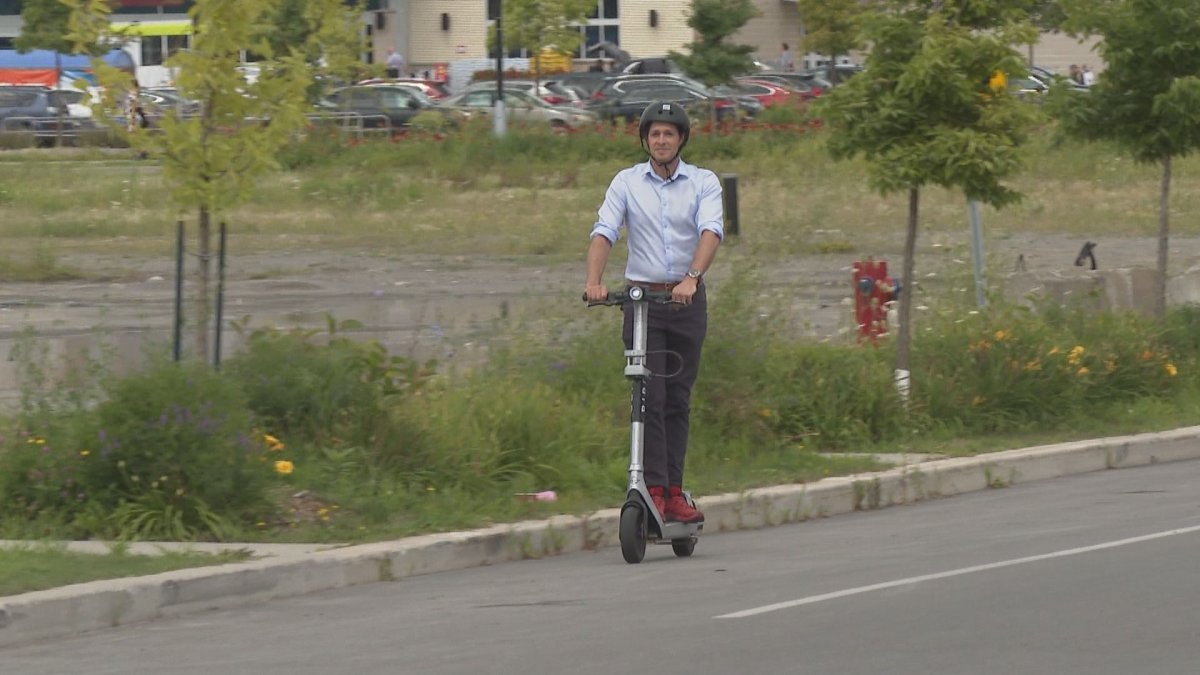They got a really bad reputation in Montreal, but Laval believes shared e-scooters can work in their territory.

A new pilot project is bringing the controversial mode of transport to the city for three years.
Laval Mayor Stéphane Boyer has fully embraced the active mode of transit. He even went to work on one, and wants Laval residents to do the same.
“This is a way to move around to have a less impact on the environment,” Boyer says.
The vehicles can now circulate between Des Laurentides and Curé-Labelle boulevards as well as Highway 440.
There will be 33 stations and about 200 e-scooters.
“We wanted to give it a shot,” Boyer says. “If we want to change things, if we want to offer new services to our citizens, that involves trying sometimes things (that) are new.”
The sharing program is new to Laval but not to Montreal. Three years ago, the metropolis pulled the plug on its own pilot project after only 90 days.
Officials argued people were not following the rules. The vehicles were abandoned everywhere, and one was even found at the bottom of the Lachine canal.
Riders also didn’t wear the required helmet.
Boyer says he’s learned from Montreal’s mistakes.
He asked both Bird and Lime — the companies bringing their e-scooters to town — to add new technologies.
- Military judges don’t have divided loyalties, Canada’s top court rules
- Alberta to overhaul municipal rules to include sweeping new powers, municipal political parties
- Grocery code: How Ottawa has tried to get Loblaw, Walmart on board
- Norad looking to NATO to help detect threats over the Arctic, chief says
“We see if people are parked in the parking spots and we even know if it’s upright,” Boyer says.
If people don’t comply, they will have to pay $50.
A helmet comes with the scooter. You have to take a picture with it on in order to unlock it.
Lime officials say they’ve also learned their lesson.
“People can expect a much improved experience compared to the last time around because the industry as a whole has changed completely,” says Jacob Tugendrajch, Lime’s communications lead for North-America and Asia-Pacific.
Tugendrajch says Lime has worked with cities to address concerns and will continue to improve their program based on feedback.
Grant McKenzie, a geography professor at McGill University, says he doesn’t expect Laval to have a “scooter-pocalypse” like the one we saw in Montreal. But there will be growing pains.
“I strongly believe that the benefits outweigh the problems for any kind of vehicle usage, these micro-mobility services. It’s going to lead to much better things in the long term,” McKenzie says.
“Seeing the city that you live in and interacting with other people, and I think that has a social and environmental benefit for the city.”
Boyer says that pilot project will be adjusted as needed and can be either cancelled or made permanent at the end of the three-year period.







Comments